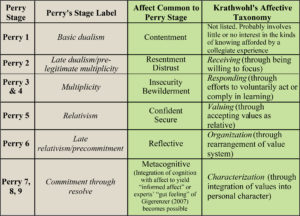by Dr. Ed Nuhfer, California State Universities (retired)
In Part 1, we showed how the initial views of behavioral scientists toward metacognition and affect led for a time to a view of intellectual development as exclusively cognitive. In Part 2, we showed that established ways of knowing each rest on unique concepts, and gaining a working understanding of any way of knowing requires first becoming aware of its supporting concepts.
In Part 2, we used the way of knowing for reaching ethical decisions to illustrate the practical necessity of understanding the four components of ethics and their relationships to each other. There seems to be no profession in which thought and practice do not involve ethical decisions, so it seems no accident that William Perry chose the title: Forms of Ethical and Intellectual Development in the College Years for his landmark book describing how higher education, when successful, changes students’ abilities to think.
Major ways of knowing, obviously ethics but even heavily objective ways of knowing such as science or quantitative reasoning, require us to commit to decisions that resolve conflicts between what we feel we want to be correct with what new knowledge leads us toward knowing to be correct. When a conflict occurs between feeling and knowing, it often arises from life experiences that we have not critically examined but which new knowledge and/or newly acquired processes of critical examination force us to confront. For part 3, we examine the role of metacognition to help understand how intellectual progress causes us to feel in certain ways as we work to gain a college education.
About a decade ago, I discovered that the Bloom team’s Taxonomy of the Affective Domain mapped so well onto the Perry Model of Intellectual Development (Nuhfer, 2008) that it provided a much-needed map for empowering metacognitive reflection on both affect and cognition. The map, summarized in Figure 1, greatly clarified for me how to better promote metacognitive development in both students and faculty. I hope that readers will find this map equally useful.
The researchers’ named equivalent stages of development appear in Figure 1’s rows, and the affective feelings noted in the middle column were those that I deduced from examining the affective comments of students recorded in Perry’s book and other studies, made within the stages deduced through researchers’ longitudinal interviews. Longitudinal studies were the basis for the Perry stages and also for the studies that followed after Perry (see Journal of Adult Development, 2004).
Figure 1. Parallel development of intellectual and affective capacities through higher education (slightly modified from Nuhfer, 2008). Metacognition must engage with emotions (middle column) if it is to be effective in advancing adult intellectual development. Otherwise, metacognition becomes just an additional tool for increasing absorption of disciplinary content.
When students know that becoming educated involves passing through an established sequence of developmental stages, each with its own defining cognitive and affective traits, they have a map that they can use to discover their present location and to guide them toward what lies ahead on the path to gaining an education. Regarding metacognition’s description as “thinking about thinking,” awareness of the sequential stages with their accompanying emotions allows students to expect, reflect, and then resolve the discomforting affective feelings that arise. Trepidation and even some fear are normal, and they even can serve as important indicators of progress in cognitive growth.
Those who strive to become educated engage in a journey toward the highest Perry Stages of intellectual development through passing through the earlier stages. Achieving resolution of our reactive affective feelings that occur during these transitional stages is often an internal struggle. Metacognition, a reflective internal conversation with self about our thinking, seems indispensable to this growth.
Important Questions when Linking Bloom’s taxonomies and Perry’s stages
Bloom’s Taxonomy of the Cognitive Domain (see Scharff, 2017) is one of the best-known contributions to education, but experts debate the degree to which the Bloom cognitive levels are hierarchical, developmental products. In contrast, the developmental character of both the Perry model and the Taxonomy of the Affective Domain is generally accepted. That both address the sequential development of college students explains why the two map better onto one another than do even the two Bloom team’s taxonomies of the cognitive and affective domains.
The map provided by Figure 1 illuminates a possible deficiency of learning design in higher education. Educators consistently refer to Perry’s highest stages of intellectual development (7, 8 & 9 – see Figure 1) as the stages characterized by metacognitive reflection. The lower stages seldom receive that recognition, so why might that be? Is metacognition just not happening in the preceding stages? If so, why not?
If those who have actually engaged in metacognition throughout their intellectual development are just those few who develop metacognitive ability spontaneously on their own, this accounts for its scarcity in the earlier stages and how few achieve the highest stages. Because intellectual and affective development requires passage through a sequence of stages, we instructors can only increase the proportion of those who attain highest-stage reasoning abilities by infusing metacognitive skills into the earlier stages as a part of our instructional design. Such design would shift all students’ perceptions of gaining an education from absorbing content provided by teachers in classrooms toward developing abilities to understand content in concert with developing understanding of self.
Dangerous Passages
Two dangerous passages in the journey through the stages of intellectual development end the educational aspirations of many students to achieve a true education marked with a celebratory graduation. Figure 1 offers a map that reveals the dangerous passages of our journey, where impactful emotions can urge us to give up on our own development. These are places where metacognition informed by only a little research on adult development can provide valuable assistance.
Many lower-division undergraduate students fail to graduate by getting trapped at the lower Perry stages 2 and 3. Stage 2 students typically view the purpose of education as learning facts rather than as experiencing challenges that develop expanded capacities to think. Further, students in Stage 2 often learn that beliefs and childhood teachings that they revere are, upon examination, flawed and perhaps even untrue. This sends them to Stage 3 and the bankrupt belief that all conclusions and arguments are equally valid. From there, educators’ efforts to move students into higher stages of thinking bring forth students’ affective reactions of frustration and bewilderment. These negative feelings can negate students’ trust in teachers and raise students’ doubts about their own abilities. At this stage, gaining relief by giving up can seem an attractive choice.
Another passage takes a similar toll, but this one manifests later, where it produces attrition of nearly half of our brightest students who gained admission to graduate school to achieve doctorates. Most Baccalaureate graduates are only Stage 4 thinkers, and in graduate school, the barrier to completion is the required dissertation, which is a challenging, open-ended Stage 5 project. Stage 5 challenges cannot be addressed by the same approaches that brought much undergraduate success— demonstrating rote knowledge and ability to perform calculations that arrived at uniquely “right answers.” The transition into Perry’s Stage 5 brings proficiency to evaluate conflicting evidence and arrive, not at “right answers,” but at conclusions that are most reasonable after evaluating all of the relevant, conflicting knowledge currently available. This high-attrition passage, not surprisingly, comes again with strong emotions. Powerful negative feelings of personal inadequacy or “imposter syndrome” often accompany the efforts to advance out of Stage 4, and too many graduate students lose confidence and withdraw before they can make the transition. If these distressed students understood the nature of the situation they were in, they likely would persist, trusting that continued perseverance would bring the necessary punctuated transition to Stage 5. With this transition comes the confidence and awareness necessary to engage ambiguous problems, which include dissertations.
In blog column Part 4, we will look at developing the affective quality of academic courage, which allows one to persist through challenges that bring fear and erosion of confidence.
References
Gigerenzer, G. (2007) Gut Feelings: The Intelligence of the Unconscious. New York. Penguin.
Journal of Adult Development (2004) Special volume of nine papers on the Perry legacy of cognitive development. Journal of Adult Development (11, 2) 59-161 Germantown NY: Periodicals Service Co.
Nuhfer, E. B. (2008) The Feeling of Learning: Intellectual Development and the Affective Domain: Educating in Fractal Patterns XXV. National Teaching and Learning Forum 18 1 7-11.






